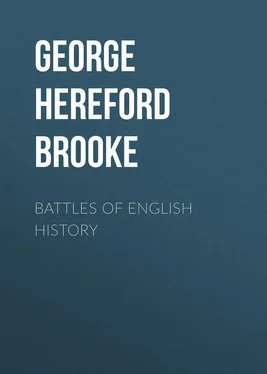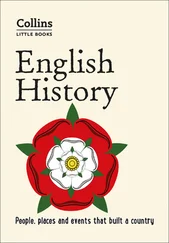Hereford George - Battles of English History
Здесь есть возможность читать онлайн «Hereford George - Battles of English History» — ознакомительный отрывок электронной книги совершенно бесплатно, а после прочтения отрывка купить полную версию. В некоторых случаях можно слушать аудио, скачать через торрент в формате fb2 и присутствует краткое содержание. Жанр: foreign_antique, foreign_prose, на английском языке. Описание произведения, (предисловие) а так же отзывы посетителей доступны на портале библиотеки ЛибКат.
- Название:Battles of English History
- Автор:
- Жанр:
- Год:неизвестен
- ISBN:нет данных
- Рейтинг книги:5 / 5. Голосов: 1
-
Избранное:Добавить в избранное
- Отзывы:
-
Ваша оценка:
- 100
- 1
- 2
- 3
- 4
- 5
Battles of English History: краткое содержание, описание и аннотация
Предлагаем к чтению аннотацию, описание, краткое содержание или предисловие (зависит от того, что написал сам автор книги «Battles of English History»). Если вы не нашли необходимую информацию о книге — напишите в комментариях, мы постараемся отыскать её.
Battles of English History — читать онлайн ознакомительный отрывок
Ниже представлен текст книги, разбитый по страницам. Система сохранения места последней прочитанной страницы, позволяет с удобством читать онлайн бесплатно книгу «Battles of English History», без необходимости каждый раз заново искать на чём Вы остановились. Поставьте закладку, и сможете в любой момент перейти на страницу, на которой закончили чтение.
Интервал:
Закладка:
Gradually the scene changed. The Danes who had begun as mere marauders, landing here and there to plunder and destroy and then return to their ships, remained in the land as conquering settlers. The English gradually adopted arms and equipment similar to those of their enemies, and learned to encounter them on equal terms. By degrees the Saxon kings of Wessex (their power, like good metal, rendered tougher by the hammering it had received from the Danes) became the effective rulers over the main part of the island, over Angles, Saxons and Danes alike, and at least nominally supreme over the Celtic fringe in the north and west. Gradually too the organisation took somewhat of a feudal character. The free ceorl bound by the general law to appear in arms for the defence of the country, becomes the "man" of a lord, bound to serve at his call. The Danish Cnut, who won the English crown by the sword after a long conflict in which there are no military differences traceable between Saxon and Dane, but who was in the end fully accepted by both alike, carried the approximation to feudalism still further. He divided England into great earldoms, resembling only too closely the duchies of Normandy and Burgundy in their tendency to become both hereditary and practically independent. When the Danish dynasty died out, the weakness of the restored Saxon king worked for good in one respect: the power of the crown was virtually wielded by Godwine, the ablest of the earls, and by his greater son after him. On the other hand the very preponderance of Godwine's house sharpened the antagonism of its rivals. When Harold, at length king in name as well as in fact, had to face the two-fold danger of invasion from Norway and from Normandy, he found those parts of England which were not ruled by himself or his brothers lukewarm in the national cause: the old separate traditions, the old race jealousy of Angle, Saxon, Dane, had resumed serious activity. The only solid support he had was the finest body of trained infantry which the world had seen since the decay of the Roman legion.
On January 5, 1066, Edward the Confessor died: his last public act had been the consecration of his new abbey at Westminster. The Witenagemot, assembled as usual at Christmas time, and probably in unusual numbers for the sake of the ceremony so dear to the heart of Edward, whose end was known to be near, felt that no time must be lost in filling the throne. The right of election beyond all possible question lay with the Witan: custom prescribed the choice of a member of the royal house, and gave obvious and natural preference to the last king's son, at any rate if he were a grown man; but not even he could have any right save by election and coronation. Now however the royal house was extinct, save a feeble boy, grandson of Edward's elder half-brother; William duke of Normandy was known to be dreaming of the English crown. Under such circumstances there was virtually no alternative but to elect some one not of royal birth: and Harold the earl of Wessex, the virtual ruler of England for some years past, was the only possible choice. Accordingly the crown was offered to him on the very day of Edward's death, and the next day saw the burial of the dead saint and the coronation of the living hero. Harold's position was a difficult one even at home, besides the danger from over seas. The earldom of Mercia, the whole centre of England, was ruled by Edwin, third in succession of a family which had been permanently hostile to the house of Godwine. Northumbria was in the hands of his younger brother Morcar, who had replaced Harold's brother Tostig, against whose tyrannous rule the men of Northumbria had revolted. The young earls were in every way contemptible, feeble in action, narrow-minded, selfish, short-sighted. They saw no reason why Harold should be preferred to themselves, and in their hatred of him lost sight of their own true interests. They dallied with the thought that England might once more be divided into separate kingdoms for their benefit, being ignorant or reckless enough to imagine that they would be able to withstand the Norman if he, through their inactivity, succeeded in conquering Wessex. For the time Harold's personal influence won over the Northumbrians, and the two earls acquiesced in his rule, and were only too glad of his assistance against the Northmen: but when the final stress came not a man whom Edwin and Morcar could control was found by the king's side.
William the Norman had absolutely no claim to the crown of England: his ambition saw an opportunity, and his unscrupulous skill made a string of baseless pretexts look sufficiently plausible to be accepted by those who wished to believe in them. He said that he was the nearest of kin to the late king, which was false; he was a distant cousin, but only through Edward's Norman mother, and so was in no way descended from the English royal house. As reasonably might the king of France have claimed the crown of the Stuarts, on the ground that the wife of Charles I. was a French princess. He said that Edward the Confessor had promised him the succession; and it is most probable that Edward, whose education had been Norman and whose sympathies were not English, had encouraged him, years before, to hope for it. But the king of England had no right to bequeath the crown; and whatever influence a dying king's recommendation might have, had been exerted in favour of Harold. He said that Harold had done him homage, and sworn 2 2 The famous story of Harold having sworn unconsciously on all the relics in Normandy, is told by the Norman writers in many different forms, more or less inconsistent with each other, and some of them demonstrably incorrect; and it is impossible to discover the truth. That William accused Harold of perjury all over Europe, and that no answer was attempted, is evidence that something of the sort had happened. As Professor Freeman points out, the absolute silence of all the English chroniclers implies that they did not know how to meet the accusation. Harold must have taken some such oath, under some form of coercion, and so have given his enemy an advantage; but obviously it would have been a greater crime to keep such an oath than to break it. Obviously too, on any version of the story that is not self-refuted, William's conduct was far more dishonourable than Harold's.
solemnly to recognise him as king after Edward's death; but nothing that Harold might have done could bind England. The crown of England was elective, freely so in form: and the only limitation which custom imposed, or which could be pretended to have legal force, confined the choice to members of a single family to which William did not belong.
Nevertheless William succeeded in making this farrago of insolent irrelevancy deceive those whom he was interested in persuading, by the aid of a policy even more unscrupulous and far-reaching than his own. In the eleventh century clearness of thought was rare; men were capable of grasping the idea of kindred, without understanding that not every form of kindred could give rights of inheritance. No one in England, except the handful of Norman settlers, would listen for a moment to William's pretensions: but in Europe generally the notions of hereditary right, and of the sacredness of royal blood, had gained a firmer hold, though fortunately for William they were still vague. It seemed as if a duke of Normandy must needs have a better claim to a vacant throne than any mere subject. Most important of all, William obtained the aid of the Church to condemn Harold for perjury. England had always been too independent to please the papacy; and Hildebrand, afterwards the greatest of popes as Gregory VII., who already swayed the papal policy, saw the value of the opportunity. To denounce Harold as having forfeited the crown by his perjury, to grant the solemn blessing of the Church to William's mission of pure conquest, would, if William succeeded, be a great step towards establishing the papal claim to make and unmake kings at will, to be supreme temporally as well as spiritually. William could thus appeal for aid to the superstition as well as to the cupidity of all the adventurers of western Europe, as the popes did later for the crusades. It was indeed the first, the most successful, and perhaps the most wicked of all crusades.
Читать дальшеИнтервал:
Закладка:
Похожие книги на «Battles of English History»
Представляем Вашему вниманию похожие книги на «Battles of English History» списком для выбора. Мы отобрали схожую по названию и смыслу литературу в надежде предоставить читателям больше вариантов отыскать новые, интересные, ещё непрочитанные произведения.
Обсуждение, отзывы о книге «Battles of English History» и просто собственные мнения читателей. Оставьте ваши комментарии, напишите, что Вы думаете о произведении, его смысле или главных героях. Укажите что конкретно понравилось, а что нет, и почему Вы так считаете.












